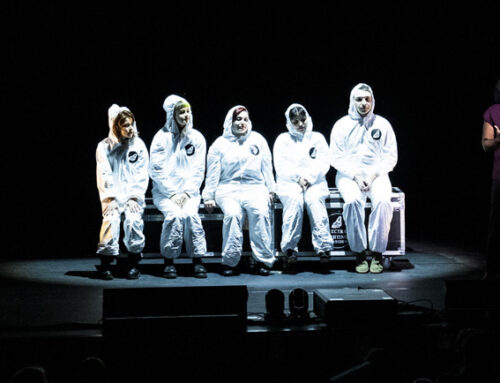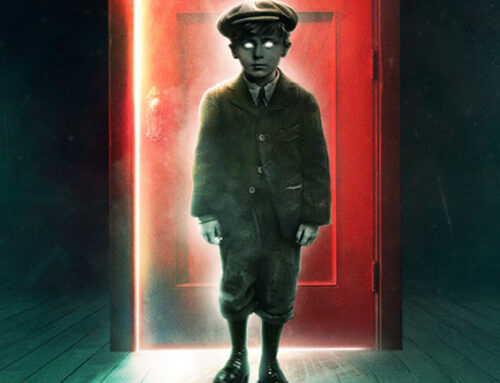Update: Due to popular demand, LiVEPLAY has been extended through February 24th and custom time slots can be selected for an additional fee. Check the event site for full details.
Keight Leighn is coming off a big year, producing and starring in two shows, Snow Fridge and #bedrUmplaI (that’s “bedroom play” for people that don’t speak Keight), both of which we reviewed quite positively. Snow Fridge premiered in June and took place in and around a venue in LA as part of the Hollywood Fringe Festival starring Leighn along with Delusion and ZJU veteran Shayne Eastin, Mikie Beatty, and a few others rounding the cast. Fast forward to August and #bedrUmplaI seems from reviews to have been a distillation of the spontaneity and intimacy that left such a strong impression with Snow Fridge, this time taking place inside of a home with the cast reduced to Eastin and Leighn.
I mention these shows not just for background but because they seem to suggest a thematic arc that may have reached its logical and creative conclusion with her latest production, LiVEPLAY. That’s not to say that things coming crashing to the ground, simply that I cannot imagine the concept of theatre being stretched any further while still being recognizable. As it stands, LiVEPLAY is more interaction theatre than interactive theatre, with the interaction being not just an element of the show but its entirety outside of a brief scripted intro and outro. Taking place entirely over Skype, it blends performance with light meditation and elements of an impromptu therapy session but fundamentally it’s a conversation and this makes it difficult to contextualize and to contrast with other shows because it’s not really a show.
Or perhaps that’s a ruse. Perhaps what appeared to be Leighn on her bed with occasional appearances of her cat (shoutout to Keight’s magical cat that may have been telepathically screwing with my lights during the performance) giving her honest thoughts on heady topics like death and the afterlife was an act and she was deftly constructing her responses and inquiries as a reaction to my temperament. Perhaps she noticed who I write for and figured death would be right up my alley so that narrative was chosen for me. Or perhaps it’s the other way around and I was being driven down the same path as everyone who came before me with the only the illusion of influence. I guess that’s part of the appeal of these interactive shows, giving the impression of a real connection along with a safe space to push buttons and see what responses might be elicited.
In that regard, Leighn, and by extension LiVEPLAY, shines. With many interactive shows, you’re given characters that might have a page or two of background to go on, along with the actor’s improv skills and whatever narrative they may have fleshed out in their heads, resulting in a limited breadth of interaction and the sense that you need you to play within their lines. Here there are no such restrictions because you’re talking to an actual person pulling from a lifetime of experience rather than a page of exposition. Basically, humans make better humans than characters. This is not without its cost, however, as this lack of characterization and a defined story arc means LiVEPLAY is almost entirely devoid of theatricality. Outside of a handful of props she seems to keep around her bed to bring out when she feels they’re poignant to the conversation there is no performance, there is no show, and as pleasant and thought-provoking as our exchange was, I couldn’t completely escape the escape the impression I was paying (or in my case taking the time to write this review) for the privilege of having a conversation with Leighn that required minimal setup on her part.
But then I go back to looking at this outside of the context of a traditional show. I’m not in the business of reviewing therapists and as far as I’m aware Leighn isn’t in the business of being one but the similarities between the structure of this show and that of a therapy session are inescapable. The first component of the show is a bit of brief bit of guided visualization to induce a state of mindfulness and what follows consists of a lot of open-ended questions to get you to riff about your thoughts and fears until you come to the startling revelation that your time has elapsed. Leighn’s not a wholly passive actor here and will frequently add her own thoughts and insight to the discussion but more so than any show I’ve experienced, LiVEPLAY is more about you, the participant, and not the performance itself. Whether she studied up on this or just happened upon her quasi-clinical approach to this show I can’t say but she’s a good fit for the role. Her improv skills allow her to play off whatever you come up with, she’s a very focused and active listener (at one point she wrote down something I said quite accurately after I’d completely forgotten it), and she has an unflinching optimism that somehow managed to shine through my advanced curmudgeonliness.
Now we come to the part I dread the most, economics. You shouldn’t put a price on art but this art does have a price so my hands are tied. Tickets are $35 (nearly $40 with tax) which is pretty much the going rate for immersive theater and not bad considering you get the performer’s undivided attention but then most performances have props and sets and a venue that must be considered in that cost as well. I wouldn’t say that LiVEPLAY isn’t worth the price of admission but the appeal is rather niche. Even among fans of immersive theatre, only a certain subset will find what they’re looking for here. Interaction is utterly essential and if you find your eyes glazing over with discussions of religion, philosophy, and the supernatural then this isn’t the show for you. If you’re looking for entertainment and someone else to hold the reins and guide you through a narrative, then this is not the show for you. While I’m sure Leighn has tricks up her sleeve to draw reactions from the apprehensive, those that will find the most fulfillment from this experience are talkers, those that yearn for a platform to speak and be heard and to have their notions challenged. In an ideal world, this would be something that would be abundant in our daily lives, but as people struggle to carry their own burdens, the only means to truly be heard can often be to see a therapist. Keight Leighn isn’t a therapist but she does play one on TV.
Tickets for LiVEPLAY are available here throughout the month of January.







